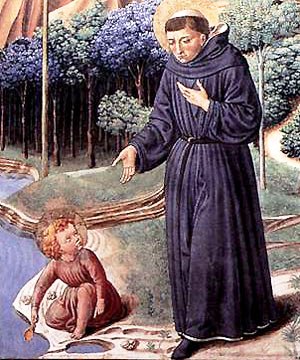This past Sunday was Trinity Sunday. There was a time when it seemed that every Trinity Sunday sermon began with some form of the story originally told by Jacobus de Varagine in his book on the lives of saints, the Golden Legend. The book was written around 1260, and was immensely popular in the late Middle Ages. From 1470 to 1530 it was the most frequently printed book in Europe.
As Augustine went by the sea-side in Africa, studying on the Trinity, he found by the sea-side a little child which had made a little pit in the sand, and in his hand a little spoon. And with the spoon he took out water of the large sea and poured it into the pit.
And when St. Augustine beheld him he marveled, and demanded him what he did. And he answered and said, ‘I will lade out and bring all this water of the sea into this pit.’
‘What?’ said he, “‘it is impossible, how may it be done, sith the sea is so great and large, and thy pit and spoon so little?’
‘Yes, forsooth,’ said he, ‘I shall lightlier and sooner draw all the water of the sea and bring it into this pit than thou shalt bring the mystery of the Trinity and His Divinity into thy little understanding as to the regard thereof; for the Mystery of the Trinity is greater and larger to the comparison of thy wit and brain than is this great sea unto this little pit.’
And therewith the child vanished away.
My reaction to this story these days is that, well, apparently the Trinity is like just about everything else in the universe. It seems that almost any aspect of reality may be greater and larger than our wit and brain.
We’re seeing more clearly that we do not “know” anything as it is. Instead, we see reality as our brains permit. Neuroscientist David Eagleman goes so far as to say: “You're not perceiving what's out there. You're perceiving whatever your brain tells you.” For example, our eyes are sensitive to a very narrow band of frequencies within an enormous range of the total frequencies of the electromagnetic spectrum. Visible light that registers on our retina is but one millionth of one percent of the entire spectrum. Who’s to say what other aspects of reality our mind and senses filter out? “Now my own suspicion,” says geneticist J.B.S. Haldane, “is that the Universe is not only queerer than we suppose, but queerer than we can suppose.”
The physicists see this most acutely. According to Richard Feynman, “In physics the truth is rarely perfectly clear, and that is certainly universally the case in human affairs. Hence, what is not surrounded by uncertainty cannot be the truth.”
Niels Bohr questions whether the “truth” should even be the goal: “There is no quantum world. There is only an abstract quantum physical description. It is wrong to think that the task of physics is to find out how nature is. Physics concerns what we can say about Nature.” Thus, “Physics is to be regarded not so much as the study of something a priori given, but rather as the development of methods of ordering and surveying human experience.” Indeed, the physicist is more of a poet than anything. “We must be clear that when it comes to atoms, language can be used only as in poetry. The poet, too, is not nearly so concerned with describing facts as with creating images and establishing mental connections.”
As St. Paul says, “we see through a glass, darkly.” The best that scientists can do is to find language that illuminates the hints they gather from the universe and creates a cohesive picture. As Bohr says, “Our task is not to penetrate into the essence of things, the meaning of which we don't know anyway, but rather to develop concepts which allow us to talk in a productive way about phenomena in nature."
Of course, my man, Nicholas of Cusa, saw all this back in 1440, long before anyone had encountered the anomalies of the atom.
Hence, regarding truth, it is evident that we do not know anything other than the following: viz., that we know truth not to be precisely comprehensible as it is. For truth may be likened unto the most absolute necessity (which cannot be either something more or something less than it is), and our intellect may be likened unto possibility. Therefore, the quiddity of things, which is the truth of beings, is unattainable in its purity; though it is sought by all philosophers, it is found by no one as it is. And the more deeply we are instructed in this ignorance, the closer we approach to truth.
Happy Trinity Sunday!

1 comment:
From nothing do we come, to nothing do we go
And in between if often seems, it's nothing that we know,
Which may be true if someone knew what truth is all about,
Yet I maintain in this domain I know, despite my doubt.
Post a Comment